|
|
|
Sort Order |
|
|
|
Items / Page
|
|
|
|
|
|
|
| Srl | Item |
| 1 |
ID:
154355
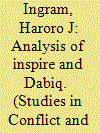

|
|
|
|
|
| Summary/Abstract |
This study analyzes how Inspire and Dabiq seek to appeal to and radicalize English-speaking Muslims. It examines how each magazine strategically designs ingroup, Other, crisis, and solution constructs and interplays these via value-, dichotomy-, and crisis-reinforcing narratives. This analysis also explores how narrative, imagery, and counternarrative messaging are used to shape readers' perceptions and polarize their support. While both magazines are dominated by narratives designed to empower readers toward action, Inspire relies heavily on identity-choice appeals while Dabiq tends to balance identity- and rational-choice messaging. This study concludes by identifying key lessons for counterterrorism strategic communications campaign and message design.
|
|
|
|
|
|
|
|
|
|
|
|
|
|
|
|
| 2 |
ID:
154356
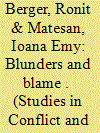

|
|
|
|
|
| Summary/Abstract |
Armed non-state actors make mistakes. Why this phenomenon occurs, and how organizations respond to their blunders, has remained understudied. This article draws on interdisciplinary research to examine sources of errors, and offers a public sensitivity argument to explain why groups claim and even apologize for their blunders. The quantitative analysis finds that all armed groups, regardless of ideology and organizational structure, are willing to apologize when there are unintended high casualty rates. A detailed analysis of three Provisional Irish Republican Army incidents reveals that public opinion is sensitive to the nature of the victims, and shows how public condemnation can impact organizational behavior.
|
|
|
|
|
|
|
|
|
|
|
|
|
|
|
|
| 3 |
ID:
154353
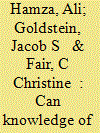

|
|
|
|
|
| Summary/Abstract |
In this research note we employ the work of Wiktorowicz who suggests that persons who are knowledgeable of Islam may be more capable of critically evaluating the claims of militant recruiters and ideologues and thus be more resistant to their appeals than those who are not knowledgeable. This gives rise to an interesting research question: Does knowledge of Islam reduce support for Islamist militancy? To evaluate this research question, we employ data derived from a nationally representative survey fielded among 16,279 Pakistanis in 2011. Using several survey items, we construct a “knowledge index” to measure respondents’ basic knowledge of Islam, which is our principal independent variable. To operationalize support for militancy we use two survey items that query respondents about their support for two prominent Islamist militant groups based in and from Pakistan: the Afghan Taliban as well the sectarian group, Sipah-e-Sahaba-e-Pakistan (also known as Lashkar-e-Jhangvi and Ahle Sunnat Wal Jamaat). We use ordinary least squares regression to evaluate the impact of our independent variables upon support for these two groups, controlling for other relevant factors. We find that knowledge of Islam does predict less support for these two groups; however, other variables such as sectarian organization and ethnicity have greater predictive power.
|
|
|
|
|
|
|
|
|
|
|
|
|
|
|
|
| 4 |
ID:
154365
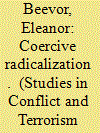

|
|
|
|
|
| Summary/Abstract |
A framework for understanding Islamic State of Iraq and al-Sham (ISIS)'s apocalyptic theology as an internal strategy to “coercively radicalize” its captive subjects is presented, by comparison to the Lord's Resistance Army (LRA), which shares key stages of captive indoctrination with ISIS. A violent experience of “entry,” religious rules learned in an “assimilation” process, and millenarian “grand narratives” framing violence as purification, are examined. These stages construct an image of group leaders as divinely endowed with spiritual knowledge and access (i.e., charismatic authority). This can create a sense of dependency on the leaders and their instructions, potentially motivating violent and altruistic behavior from initially unwilling subjects.
|
|
|
|
|
|
|
|
|
|
|
|
|
|
|
|
| 5 |
ID:
154357


|
|
|
|
|
| Summary/Abstract |
The aim of this article is to identify characteristics of communities where persons indicted under terrorism charges lived, planned, and prepared prior to carrying out a terrorist act. Guided by a model of community deterioration and using data from the Terrorism and Extremist Violence in the United States database, findings indicate: (1) half of all census tracts where terrorists planned and prepared for attacks were located in the western United States; nearly one fourth were in the Northeast; (2) nationally, terrorist pre-incident activity is more likely to occur in census tracts with lower percentages of high school graduates for Al Qaeda and associated movements (AQAM) terrorism but not for far-right terrorism, higher percentages of households living below the poverty level, more urban places, and more unemployed; and (3) communities with terrorist pre-incident activity are different types of places compared to those where there was no pre-incident activity, generally between different regions of the country, and specifically in terms of differences across far-right and AQAM terrorist movements.
|
|
|
|
|
|
|
|
|
|
|
|
|
|
|
|
| 6 |
ID:
154361


|
|
|
|
|
| Summary/Abstract |
The Islamic State in Iraq and Syria (ISIS)'s activities now go beyond insurgency and conventional operations in the territories it controls in the Middle East. It poses a threat to U.S. interests and allies in Europe, and a serious threat to Iran and its borders. While Washington formed an international coalition encompassing many European and Middle Eastern states to combat ISIS, it only coordinates some tactical and operation-level efforts with a key player on the ground: Iran. For its part, Iran is leveraging similar counter-ISIS tools as those adopted by the United States, despite their strategies differing fundamentally.
|
|
|
|
|
|
|
|
|
|
|
|
|
|
|
|
| 7 |
ID:
154352


|
|
|
|
|
| Summary/Abstract |
Online threats by terrorist groups are viewed as a special type of discourse that sends menacing explicit messages, expressing not only an intention to cause a direct physical harm to the threatened, but also to show a commitment to destroy public property or cause a change of system or government. This study applies critical discourse analysis with some insights from pragmatics to analyze the discourse-pragmatic contents of terror threats by two terrorist groups in Nigeria—Boko Haram and Ansaru. Explicit and implied threats are examined from seven online publications by these groups written between 2009 and 2012. This study shows that terror threats by Nigerian terrorist groups are intertextually and ideologically related to threats associated with Al Qaeda and global jihad, which also goes further to establish their strong link and influence with other terror groups around the world. The findings also show that the structure of terror threats is significantly different from the conventional formula for verbal threats.
|
|
|
|
|
|
|
|
|
|
|
|
|
|
|
|
| 8 |
ID:
154363


|
|
|
|
|
| Summary/Abstract |
General media outlets are increasingly arguing that the looting of cultural heritage artifacts contributes to the funding of terrorist groups such as Islamic State of Iraq and Syria (ISIS). This article reexamines this claim in light of the political science literature on internal conflicts duration. While we do know that armed conflicts contribute to an increase of looting activities in the territories at war, it is still too early to generalize the ISIS case and conclude that these activities contribute to significantly funding armed non-state actors and to prolonging internal armed conflicts. However, establishing this link may add political weight to archeologists' and art historians' efforts to curb the international trafficking of looted objects.
|
|
|
|
|
|
|
|
|
|
|
|
|
|
|
|
| 9 |
ID:
154362


|
|
|
|
|
| Summary/Abstract |
This article argues that the concept of the “domestic security dilemma” can help us to better understand public opposition to government counterterrorism policies. It examines the concept of the “security dilemma” in international relations theory and argues that this concept can also be applied to the analysis of domestic security politics. The article explains that when the government takes actions intended to make people safer from terrorist threats, it often has the unintended consequence of heightening concerns about government oppression. Thus, counterterrorism represents a “domestic security dilemma”—a situation where security tradeoffs have consistently undermined anticipated security gains.
|
|
|
|
|
|
|
|
|
|
|
|
|
|
|
|
| 10 |
ID:
154350
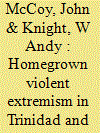

|
|
|
|
|
| Summary/Abstract |
The article examines the subject of homegrown violent extremism related to militant Islamism in the dual-Island Caribbean state of Trinidad and Tobago (T & T). It employs original research drawn from a series of semi-structured interviews and focus groups conducted between November 2015 and January 2016. Tracing the evolution of endogenous forms of radicalism and extremism the article considers how globalized-exogenous forms of militant Islamism associated with Al Qaeda and its offshoots, such as the so-called Islamic State, have impacted local patterns of violent extremism. The case study draws attention to a state and a region that have received scant attention in terrorism studies. As demonstrated by the article, this oversight is imprudent. There are a number of noteworthy findings from this case study for terrorism studies scholars: the unique historical legacy of radicalism, extremism and insurrection among T & T's Islamists; the country's markedly high levels of extremist travelers on a per capita basis and the high rate of religious converts among those travelers; the inter-linkages between criminality and political violence; and the potential threat posed by Trinidadian and Tobagonian militancy regionally.
|
|
|
|
|
|
|
|
|
|
|
|
|
|
|
|
| 11 |
ID:
154358


|
|
|
|
|
| Summary/Abstract |
The causes and consequences of the Boko Haram insurgency as well as its possible solutions have been subjected to different interpretations among scholars, politicians, and journalists. Little is known, however, about how the Nigerian populace thinks about the uprising. The present study contributes to the literature on Boko Haram by analyzing the perceptions of Nigerian students vis-à-vis Boko Haram's agenda and the government's response. The results demonstrate a north–south divide with Christians or Igbo and Muslims or Hausa-Fulani holding different ideas on the causes of the crisis, being differently affected by it, and slightly disagreeing on the desirability of military government responses. In conclusion, perceptions on Boko Haram lay bare ethno-religious fault lines reflecting existing grievances, thereby possibly undermining efforts at nation-building and peaceful coexistence in the multi-ethnic Nigerian society.
|
|
|
|
|
|
|
|
|
|
|
|
|
|
|
|
| 12 |
ID:
154360


|
|
|
|
|
| Summary/Abstract |
In his influential and provocative article on “What ISIS Really Wants,” published in The Atlantic in March 2015, Graeme Wood argued that “the Islamic state is Islamic. Very Islamic.” He also sought to challenge what he diagnosed as a “western bias” among academics and policymakers toward religious ideology, whereby religious doctrines or beliefs are relegated to the status of epiphenomena rather than taken seriously as causal properties in their own right. Wood's article sparked a wider—and still ongoing—debate over the relationship between Islam and jihadist violence. For one side in this debate, Islamic State of Iraq and Syria (ISIS) is inexplicable without reference to Islamic scripture; indeed, some commentators and politicians have even argued that it represents the “true” face of Islam; for the other side, ISIS is a hideous distortion of Islam's “true” teachings, and is inexplicable without reference to the wider political circumstances in which it emerged and to which it is a response. This article attempts to forge a middle way between these two polarized viewpoints by arguing that any comprehensive account of ISIS must recognize both its secular and theological bases. More specifically, and drawing on the work of the intellectual historian Quentin Skinner, it argues that Wood's critics, in their understandable but misplaced eagerness to detach Islam from jihadist violence, fail to accord proper causal weight to the legitimizing role of revolutionary Islamic ideas—and the innovating ideologists who develop these—in the commission of this violence.
|
|
|
|
|
|
|
|
|
|
|
|
|
|
|
|
| 13 |
ID:
154351


|
|
|
|
|
| Summary/Abstract |
Yemen once again descended into chaos in November 2014, when the Houthis seized control of Sana'a. Saudi Arabia and its Gulf Cooperation Council partners, along with mainstream media, characterized the conflict as a sectarian proxy-war with Iran. However, this narrative fails to acknowledge the trajectory of Yemen's Arab Spring revolt. This article refutes this narrative by using theories of revolution to connect the Arab Spring revolt to the current conflict. Situating Yemen within a broader revolutionary moment sheds light on patterns of revolution in Third World societies and the likely outcome of the current conflict.
|
|
|
|
|
|
|
|
|
|
|
|
|
|
|
|
|
|
|
|
|